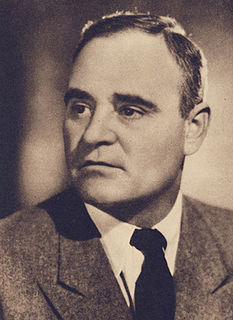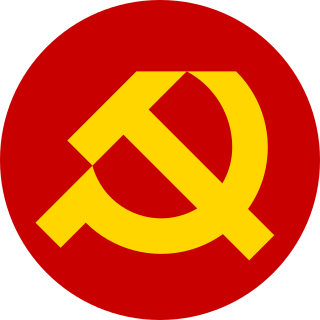
Bulgaria elects on national level a head of state - the president - and a legislature. The president is elected for a five-year term directly by the people. The National Assembly has 240 members, elected for a four-year term by proportional representation in multi-seat constituencies with a 4% threshold. Bulgaria has a multi-party system, in which no one party often has a chance of gaining power alone, and parties must work with each to form governments.
The Democratic Party is a center-right party in Bulgaria led by Alexander Pramatarski. The party is a member of the European People's Party (EPP).

A constitutional referendum was held in France on 5 May 1946. Voters were asked whether they approved of a new draft Constitution proposed by the Constituent Assembly elected in 1945.

Parliamentary elections were held for the first Supreme People's Assembly in the Soviet-occupied North Korea on 25 August 1948. A total of 572 deputies were elected, of which 360 were reserved for representatives of South Korea. The North Korean government claimed that 77.8% of South Korean voters had taken part in underground elections to elect 1,000 delegates who would elect the 360 South Korean members of the SPA. Voters were presented with a single list from the Democratic Front for the Reunification of the Fatherland, which was dominated by the Workers' Party of Korea.
Constitutional Assembly elections were held in Bulgaria on 10 June 1990, with a second round for eighteen seats on 17 June. They were the first elections held since the fall of Communism the previous winter, and the first free national elections since 1931. The elections were held to elect the 7th Grand National Assembly, tasked with adopting a new (democratic) constitution. The new electoral system was changed from 400 single-member constituencies used during the Communist era to a split system whereby half were elected in single member constituencies and half by proportional representation. The result was a victory for the Bulgarian Socialist Party, the freshly renamed Communist Party, which won 211 of the 400 seats. Voter turnout was 90.3%.

Parliamentary elections were held in Bulgaria on 8 June 1986. The Fatherland Front, dominated by the Bulgarian Communist Party, was the only organisation to contest the election; all candidate lists had to be approved by the Front. The Front nominated one candidate for each constituency. Of the 400 candidates 276 were members of the Communist Party, 99 were members of the Bulgarian Agrarian National Union and the remaining 25 were unaffiliated. Voter turnout was reportedly 99.5%.

Parliamentary elections were held in Bulgaria on 7 June 1981. The Fatherland Front, dominated by the Bulgarian Communist Party, was the only organisation to contest the election; all candidate lists had to be approved by the Front. The Front nominated one candidate for each constituency. Of the 400 candidates 271 were members of the Communist Party, 99 were members of the Bulgarian Agrarian National Union and the remaining 30 were unaffiliated. Voter turnout was reportedly 99.9%.

Parliamentary elections were held in Bulgaria on 30 May 1976. The Fatherland Front, dominated by the Bulgarian Communist Party, was the only organisation to contest the election; all candidate lists had to be approved by the Front. The Front nominated one candidate for each constituency. Of the 400 candidates 272 were members of the Communist Party, 100 were members of the Bulgarian Agrarian National Union and the remaining 28 were unaffiliated. Voter turnout was reportedly 99.9%.

Parliamentary elections were held in Bulgaria on 27 June 1971, the first held under the new Zhivkov Constitution, which had been approved in a referendum held a month earlier. The Fatherland Front, dominated by the Bulgarian Communist Party, was the only organisation to contest the election; all candidate lists had to be approved by the Front. The Front nominated one candidate for each constituency. Of the 400 candidates 268 were members of the Communist Party, 100 were members of the Bulgarian Agrarian National Union and the remaining 32 were unaffiliated. Voter turnout was reportedly 99.9%.

Parliamentary elections were held in Bulgaria on 18 December 1949. They were the first legislative elections held under undisguised Communist rule. With all meaningful opposition having been destroyed, voters were presented with a single list from the Fatherland Front, dominated by the Bulgarian Communist Party. According to official figures, almost 4.7 million people turned out to vote and only 980 of them voted against the list, while another 109,963 ballots were invalid or blank. Voter turnout was reportedly 98.9 percent.

Parliamentary elections were held in Bulgaria on 20 December 1953. Voters were presented with a single list from the Fatherland Front, dominated by the Bulgarian Communist Party. As the Fatherland Front was the only organisation to contest the election and all candidate lists had to be approved by the Front, voters only had the option of voting for or against the Front list. Only 0.2% of vote were cast against the Front. Voter turnout was reportedly 99.5%.

Parliamentary elections were held in Bulgaria on 22 December 1957. Voters were presented with a single list from the Fatherland Front, dominated by the Bulgarian Communist Party. As the Fatherland Front was the only organisation to contest the election and all candidate lists had to be approved by the Front, voters only had the option of voting for or against the Front list. Only 2,076 of the 5,206,103 valid votes were cast against. Voter turnout was reportedly 99.8%.

Parliamentary elections were held in Bulgaria on 25 February 1962. Voters were presented with a single list from the Fatherland Front, dominated by the Bulgarian Communist Party. As the Fatherland Front was the only organisation to contest the election and all candidate lists had to be approved by the Front, voters only had the option of voting for or against the Front list. Only 1,668 of the 5,462,892 valid votes were cast against the Front list. Voter turnout was reportedly 99.7%.

Parliamentary elections were held in Bulgaria on 27 February 1966. Voters were presented with a single list from the Fatherland Front, dominated by the Bulgarian Communist Party. As the Fatherland Front was the only organisation to contest the election and all candidate lists had to be approved by the Front, voters only had the option of voting for or against the Front list. Only 2,089 of the 5,746,161 valid votes were cast against the Front list. Voter turnout was reportedly 99.6%.

Elections for the Third German People's Congress were held in East Germany on 15 and 16 May 1949. Voters were presented with a "Unity List" from the "Bloc of the Anti-Fascist Democratic Parties," which in turn was dominated by the Communist Socialist Unity Party. They only had the option of approving or rejecting the list. In much of the country, the vote was not secret.

Parliamentary elections were held in Romania on 30 November 1952. They were the second held under undisguised Communist rule, and the first under a constitution adopted that September. Voters were presented with a single slate of candidates from the People's Democratic Front, which was dominated by the Romanian Workers Party. The Front won all 428 seats in the Great National Assembly. This election set the tone for all elections held in Romania until 1989. For the remainder of the Communist era, voters only had the choice of approving or rejecting a Communist-dominated list.

Parliamentary elections were held in Romania on 2 March 1969. The Front of Socialist Unity, which had been formed a year earlier to replace the People's Democratic Front, was the only organization that contested the election; no prospective candidate could run for office without the Front's approval. Like the People's Democratic Front, the Front of Socialist Unity was dominated by the Romanian Communist Party. The Front won all 465 seats in the Great National Assembly.

Parliamentary elections were held in Romania on 9 March 1975. The Front of Socialist Unity, dominated by the Romanian Communist Party and including other mass organisations, was the only organisation that contested the election. No prospective candidate could run for office without the Front's approval. The Front won all 349 seats in the Great National Assembly.

Parliamentary elections were held in Romania on 17 March 1985. The Front of Socialist Unity, dominated by the Romanian Communist Party and including other mass organisations, was the only organisation that contested the election. No prospective candidate could run for office without the Front's approval. The Front won all 369 seats in the Great National Assembly. These would be the last single-party elections held in Romania; the Communists would be overthrown four years later.

The National Liberal Party was a political party in Bulgaria.










